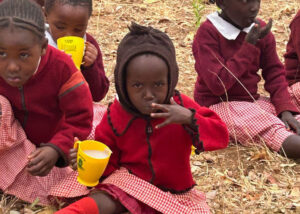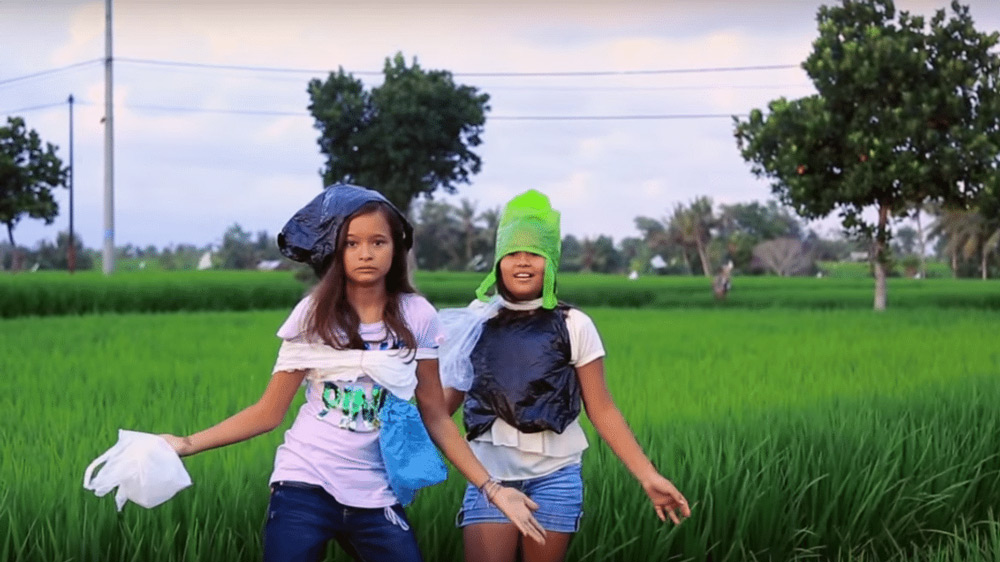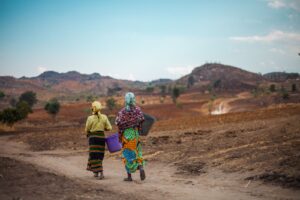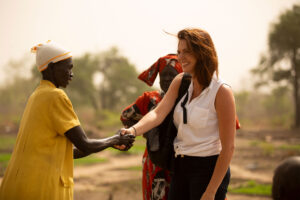
Betty Kibaara — Director of Food Initiatives, Rockefeller Foundation
Leading the Foundation’s investments in Africa, transforming food systems for children that increase access to nutritious foods.
Bali, Indonesia
Mood of Living August 15, 2024
Growing up on the island of Bali, Indonesia, sisters Melati and Isabel Wijsen were just 10 and 12 years old when they decided to take a stand against the plastic pollution threatening their island’s natural beauty. Learning that 40 countries had already banned single-use plastic bags, they embarked on a mission to inspire the people of Bali to join their movement to say no to single-use plastic bags. In 2013, they created the NGO Bye Bye Plastic Bags.
Recognizing the need for collective action, the sisters quickly organized teams of young students from both local and international schools across Bali. Together, they began cleaning up their environment, a series of efforts that soon blossomed into a larger movement. Their success inspired people of all ages and backgrounds to join in through education, campaigns, political advocacy, and further clean-ups. Their relentless efforts culminated in a 2014 meeting with the governor, who signed an MOU to work towards a plastic bag ban on the island. From their initial call to action to building a global movement, they have collected over 100 tons of plastic waste from Bali alone.
The sisters have since become influential voices on the world stage, speaking at 1,345 events globally, including at the UN and TED Talks. They have reached over 1,000,000 students, donated 10,795 educational booklets to Indonesian elementary schools, and launched the Mountain Mamas project — a social enterprise empowering women on the slopes of Mount Batu Karu in Bali to create alternative bags from repurposed materials. Their organization, Bye Bye Plastic Bags (BBPB), has grown into a global movement with teams in 30 countries and their impact has reached more than 12 million people worldwide.
In 2020, Melati founded Youthtopia, a platform offering free peer-to-peer courses and masterclasses. Through Youthtopia’s Circle of Youth network, 300 young changemakers share peer-to-peer training with other rising youth. The organization also connects companies with younger consumers to promote corporate social responsibility.
MoL: Where did you grow up?
Melati Wijsen: I grew up on the island of Bali!
MOL: What inspired you and your sister Isabel to create your youth-driven NGO Bye Bye Plastic Bags at such a young age? How old were you when you began your campaign? What was your intention? Why did you focus on plastic bags?
MW: Growing up on the island of Bali and being surrounded by the natural world, it wasn’t hard to see the destruction caused by plastic pollution. It was everywhere. So, at the ages of 10 & 12 years old, in 2013, my sister and I said enough is enough. We didn’t want to sit around and watch our island drown in plastic pollution. We learned at the time that 40 countries had already banned single-use plastic bags, so we thought “Easy! Come on Bali, come on Indonesia, we can do it too!” And the rest, as they say, is history. We set off on a mission to make the people on Bali say no to single-use plastic bags.
Melati & Isabel and team members of Bye Bye Plastic Bags
Photos: Bye Bye Plastic Bags — Bali Indonesia
MoL: How were you able to create a movement while still going to school? Tell us about Green School Bali. Did your education influence your passion for environmental activism?
MW: It took a lot of persistence and commitment. We learned very quickly the importance of building a team. You cannot create change on your own. Our team was built of other young students on the island of Bali, from all international and local schools. This growing group of young people allowed us to continue building momentum at the same time as going to school.
MoL: What were the first steps in creating your NGO Bye Bye Plastic Bags? How did you engage other children on the island to help you with your cause?
MW: Building a team was top of our list, we knew we couldn’t do it alone. Next to this, we made sure our message and call to action were very clear; we wanted the people in Bali to say Bye Bye to plastic bags. Simple, right? This clear call to action allowed us to gain momentum and invite many more students and people of all ages and backgrounds to join our movement. And lastly, one of our other core steps throughout the journey was to ensure we always had fun! We wanted our movement to always be as inviting and unique as possible.

Melati (12) & Isabel (10), 2013 filming their first video for Bye Bye Plastic Bags
Photo: Bye Bye Plastic Bags — Bali, Indonesia.
MoL: How did you get the government to help? What kind of protesting efforts did you do that led to the official ban of plastic bags in Bali?
MW: It took a lot of work and a lot of collaboration between many organizations. It is thanks to the many like-minded organizations and individuals that Bali now has an official law against single-use plastic bags, straws, and Styrofoam! It shows true people power and what can happen when we work together.
MoL: How did your campaign organize cleanups, presentations, and the distribution of alternative bags? Tell us about Bali’s biggest beach cleanup in 2018. How many people helped to collect plastic waste and how much was collected? What do you do with this waste?
MW: Clean-ups are a great tool to raise awareness, but we don’t believe it is the solution. Therefore, we organized an annual island-wide clean-up that quickly turned into one of the island’s most iconic events of the year. The idea behind One Island One Voice’s annual clean-up called Bali’s Biggest Clean Up was to create an event where all entities in Bali could come together and create momentum around the problem of plastic pollution. It didn’t matter if you were a business owner, a student, or a community organizer, everybody could join the event and show solidarity against the rise of plastic pollution. In our first year organizing it we had mobilized over 10,000 people to join us on our one-day event. It was incredible to see!
Seseh Beach, Nusa Penida, Pantai Mengening, Perancak, and Sungai Watch Clean Ups.
Bali, Indonesia.
MoL: How is your organization solving the problem of waste management systems in Bali? What can other countries without organized waste management systems learn from the solutions you have locally implemented in Bali?
MW: As a youth-led organization, our focus is mainly on education and changing behavior and mindset. We do this through our educational workshops that we deliver in schools across the country as well as the distribution of more than 15,000 Educational Booklets. We believe that change can start in the classroom, and hope that one day, schools everywhere will empower students to take positive action for the environment.
MoL: You also started the people-powered movement One Island One Voice and the social enterprise, Mountain Mamas, working with local women in Bali to create alternative bags made from recycled, donated materials. What positive impact have these organizations had on communities and the environment in Bali?
MW: Mountain Mamas is a social enterprise focused on empowering local women to produce alternative bags from pre-loved materials. Since joining the enterprise, we have seen a tremendous increase in women empowerment within the local village. More women are stepping up in leadership roles and through Mountain Mamas are also earning their own incomes.
Mountain Mamas
Bali Indonesia
MoL: Bye Bye Plastic Bags can be found in 50 locations around the world with teams led by young people who want to bring the message of saying no to plastic bags. How did you grow the organization as an international movement of creating change by youth for a better planet? How can communities start their own BBPB Team in their communities?
MW: The aspect of going global was a surprise to us as well! When we received the first few reachouts from youth around the world to start their own teams, we were overjoyed! We saw how Bye Bye Plastic Bags became a living example that kids can do things. We created a starter kit and an onboarding process and quickly grew as a global movement led by youth. This application process was set up to ensure that we found the right person to lead the movement in the long term and who had enough support from teachers and/or parents to take the initiative to the next level.
Melati participating in a local youth led climate strike in Tasmania during one of her overseas conferences — School March for Climate — Melati at Amsterdam Business Forum + European Youth Event —Melati at a student march that the team help lead.
MoL: Why did you and Isabel create YOUTHTOPIA? Tell us about this organization and how you are empowering youth today around the world. What is your mission?
MW: We created YOUTHTOPIA because we noticed that when we shared the story of Bye Bye Plastic Bags and how we were able to create change, students would always ask the same question; How can we create change too? So many of us want to get involved in creating change but often don’t know where and how to start. We created YOUTHTOPIA to create a community of global young changemakers who share their knowledge and experience in creating change. We focus on peer-to-peer education and the 17 SDG’s in all of our 150+ programs which now live on our free learning platform. Our goal is to change the narrative of what it means to be a changemaker and invite everyone to join the movement.
Youthtopia and Bye Bye Plastic Bags Headquarters.
Bali, Indonesia
MoL: What countries have you traveled to speak to youth, and how many students have you spoken to? How are you helping youth to be young changemakers?
MW: Since we started in 2013, we have spoken to nearly 1.5 million students in more than 30 countries! Today, through YOUTHTOPIA we hope we are helping more students start their changemaking journey.
MoL: You have spoken on world stages such as the UN Conference, World Oceans Day 2017, TED, honored by TIME in 2018 as part of the most influential teens in the world, part of the CNN Young Wonders, FORBES 30 under 30, and co-wrote the documentary Bigger Than Us, awarded the César Award for Best Documentary Film in 2022. You have accomplished so much to help our planet at such a young age. What are your future goals?
MW: Our future goals at the moment, are really focused around making YOUTHTOPIA the #1 learning platform for young changemakers. We believe in the power of youth-led change! Our goals are to create more programs that share how anyone can lead by example and start creating positive change. Next to this, I am also writing a book! This book will be released in January 2025 and will feature stories, practical advice, and motivational pieces that I learned throughout my 10+ years on the frontlines of change.
Melati’s TED talk: A roadmap for young changemakers.
Video : TED
MoL: What message can you give to youth around the world who want to be changemakers? What difference can they make?
MW: Don’t wait until you are older to create change! Start now with what you have and what you know. Leading by example is the most powerful tool to create change. Find your peers, find your focus, and go for it!
Photography courtesy of Bye Bye Plastic Bags

Leading the Foundation’s investments in Africa, transforming food systems for children that increase access to nutritious foods.

charity: water — A non-profit organization founded in 2006 by Scott Harrison.

Founder Treana Peake, supports artisan partnerships and funds development work through the Obakki Foundation.